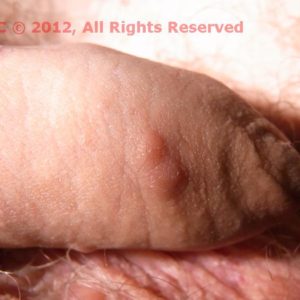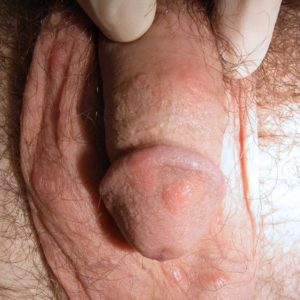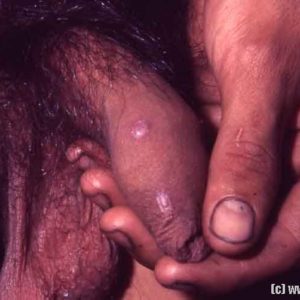Scabies
Scabies is an itchy skin condition caused by a parasite. Tiny mites (bugs) burrow under the skin, which irritates the skin and promotes scratching. Scabies can be transmitted by direct, prolonged physical contact, including sexual activity. It can also be transmitted from one part of the body to another through scratching. Commonly affected sites are the wrists, between the fingers and toes, elbows, knees, buttocks, and the penis and scrotum.
Scabies can survive outside the body for 24 to 36 hours. This means it is possible to get scabies from infected articles such as bed linen and clothing (although this is much less common). Scabies is contagious and spreads quickly, even when there are no symptoms. Those around you may also need to be treated if you have scabies.
Scabies is an itchy skin condition caused by a parasite. Tiny mites (bugs) burrow under the skin, which irritates the skin and promotes scratching. Scabies can be transmitted by direct, prolonged physical contact, including sexual activity. It can also be transmitted from one part of the body to another through scratching. Commonly affected sites are the wrists, between the fingers and toes, elbows, knees, buttocks, and the penis and scrotum.
Scabies can survive outside the body for 24 to 36 hours. This means it is possible to get scabies from infected articles such as bed linen and clothing (although this is much less common). Scabies is contagious and spreads quickly, even when there are no symptoms. Those around you may also need to be treated if you have scabies.
Signs and Symptoms
Symptoms usually do not appear for 2-6 weeks when a person is first infested with scabies mites.
Symptoms usually appear much sooner (1-4 days) after exposure in someone who has had scabies.
Scabies infestation may be complicated by bacterial infection, leading to the development of skin sores. It can cause more severe complications if left untreated.
Skin/Genitals
If signs or symptoms are present, there may be:
- Intense itching of the skin, typically worse at night and after a hot bath or shower
- Tiny wavy lines under the skin surface, especially between the fingers and in skin creases such as armpits and genitals
- A bumpy or pimple-like rash
- Small, clear, fluid-filled spots or lesions
- Very itchy bumps on the scrotum or labia
Penis
- Because the skin on the penis is loose and soft, the infection sites become small raised scabs, especially when scratched.
Symptom Images (content warning: click or tap to expand)
Transmission
Scabies is passed from skin to skin by close physical contact, including sexual contact. Scabies can also be transmitted through shared objects such as clothes, towels or bedding.
Prevention
The best way to prevent transmission of scabies is to avoid skin-to-skin contact with someone who has visible signs or symptoms.
Testing
Here’s some information about testing for scabies. You can view a list of sex worker-friendly sexual health clinics on our Where To Test page.
Testing Method
- Visual examination, checking for burrows in the infected area/s
- Sometimes a small skin scraping is taken to confirm the diagnosis
When to Test
- If you notice any visible symptoms of scabies
- If you have had close physical contact or shared bedding, towels or clothing with someone with signs of scabies
Other Info
- You may have to pay to see the doctor, or you may be bulk billed
- Sexual health clinic services are usually free, regardless of your Medicare eligibility
Treatment
Scabies is treatable. Here’s what you need to know about treating it.
Treatment Method/s
- Applying a permethrin 5% solution to the skin. This can be bought over the counter at pharmacies. Follow the directions on the bottle.
- Wash clothing, towels and bedding in hot water whilst being treated.
Costs and Other Information
- After the first treatment, you will no longer be contagious.
- Medicines work quickly to kill the mites, but the itchy rash may last several weeks after treatment.
- Sexual partners and other household contacts also require treatment to prevent re-infection, even if they do not have symptoms.
- See your doctor if over-the-counter treatment does not work.
- Scabies will not go away on their own.
How might this impact my work?
Practical Considerations
- Scabies can be passed between clients and sex workers via skin-to-skin contact. Use barriers or offer alternative services if you are concerned about transmission or notice visible symptoms on your or your client’s skin.
- After the first treatment, you will no longer be contagious, so scabies is unlikely to impact your ability to work.
- You should inform any recent doubles partners if you discover you have scabies.
You Might Also Be Interested In…
What are BBV & STI?
Lorem ipsum dolor sit amet, consectetur adipiscing elit, sed do eiusmod tempor incididunt ut labore et dolore magna aliqua. Ut enim ad minim veniam, quis nostrud exercitation ullamco laboris nisi ut aliquip ex ea commodo consequat.
Testing Timeframes
Lorem ipsum dolor sit amet, consectetur adipiscing elit, sed do eiusmod tempor incididunt ut labore et dolore magna aliqua. Ut enim ad minim veniam, quis nostrud exercitation ullamco laboris nisi ut aliquip ex ea commodo consequat.
Alternative Services
Lorem ipsum dolor sit amet, consectetur adipiscing elit, sed do eiusmod tempor incididunt ut labore et dolore magna aliqua. Ut enim ad minim veniam, quis nostrud exercitation ullamco laboris nisi ut aliquip ex ea commodo consequat.
Testing Locations
Lorem ipsum dolor sit amet, consectetur adipiscing elit, sed do eiusmod tempor incididunt ut labore et dolore magna aliqua. Ut enim ad minim veniam, quis nostrud exercitation ullamco laboris nisi ut aliquip ex ea commodo consequat.









